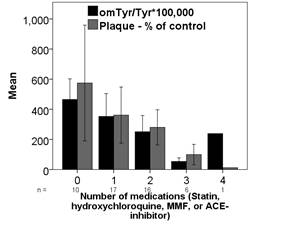Session Information
Date: Monday, November 6, 2017
Title: Systemic Lupus Erythematosus – Human Etiology and Pathogenesis Poster I
Session Type: ACR Poster Session B
Session Time: 9:00AM-11:00AM
Background/Purpose: No single medication has been demonstrated as effective in reducing atherosclerosis or cardiovascular events in systemic lupus erythematosus (SLE), possibly due to the heterogeneity of mechanisms leading to atherosclerosis. However, selecting medications that affect final common pathways to atherosclerosis may be effective. Oxidative stress induces endothelial dysfunction and oxidation of LDL, both of which increase atherosclerotic plaque formation. We hypothesized that medications associated with reduced oxidative stress will also have a reduced association with atherosclerosis and that combining medications will be associated with further reductions in atherosclerosis and oxidative stress.
Methods:  SLE patients meeting ACR criteria with inactive disease (SLE Disease Activity Index < 4) were enrolled. Bilateral carotid total atherosclerotic plaque area (TPA) was determined by ultrasound and reported as a percent of the mean (TPA%) for age and sex matched non-SLE controls in a large, high risk hypertension clinic. Serum was digested into amino acids and analyzed for durable oxidative modifications to serum protein tyrosine (ortho-tyrosine + meta-tyrosine (omTyr)) by high performance liquid chromatography and electrochemical detection as a surrogate marker for systemic oxidative stress and reported as (omTyr/Tyr)*100,000. Concurrent medications associated with reduced omTyr were included in the analysis. Patients were categorized by the number of these medications (0-4) they were taking. Groups were compared by Mann-Whiteny U tests, and correlations were performed by Spearman correlation.
SLE patients meeting ACR criteria with inactive disease (SLE Disease Activity Index < 4) were enrolled. Bilateral carotid total atherosclerotic plaque area (TPA) was determined by ultrasound and reported as a percent of the mean (TPA%) for age and sex matched non-SLE controls in a large, high risk hypertension clinic. Serum was digested into amino acids and analyzed for durable oxidative modifications to serum protein tyrosine (ortho-tyrosine + meta-tyrosine (omTyr)) by high performance liquid chromatography and electrochemical detection as a surrogate marker for systemic oxidative stress and reported as (omTyr/Tyr)*100,000. Concurrent medications associated with reduced omTyr were included in the analysis. Patients were categorized by the number of these medications (0-4) they were taking. Groups were compared by Mann-Whiteny U tests, and correlations were performed by Spearman correlation.
Results: Among 50 SLE patients (90% female, 96% African American, median age=44), mycophenolate, (MMF) angiotensin converting enzyme inhibitor (ACE), statin, and hydroxychloroquine (HDQ) use were all associated with a trend to lower TPA% and omTyr (with ACE inhibitors associated with a significantly less TPA%, median(interquartile range) = 0 (0-24) vs. 116 (0-448), p = 0.02). The number of these medications taken together trended to lower omTyr and TPA% (Figure) and correlated negatively with omTyr (r = -0.31, p – 0.04).
Conclusion: In other populations, both ACE and statins are associated with lower cardiovascular events and reduced oxidative stress. MMF reduces expression of inducible nitric oxide synthase, an enzyme source of oxidative stress that is overexpressed in lupus nephritis, while HDQ reduces oxidative stress and improves endothelial function in murine lupus and is associated with lower cardiovascular events in human SLE. This is the first study to our knowledge to evaluate its association with oxidative stress and atherosclerosis in human SLE. This cross sectional study inspires the hypothesis that combining medications chosen by their ability to reduce the sources of systemic oxidant stress may be more effective than any one medication to reduce atherosclerosis in SLE.
To cite this abstract in AMA style:
Oates JC. Combining Medications That Lower Systemic Oxidative Stress Is Associated with Less Atherosclerosis in Systemic Lupus Erythematosus [abstract]. Arthritis Rheumatol. 2017; 69 (suppl 10). https://acrabstracts.org/abstract/combining-medications-that-lower-systemic-oxidative-stress-is-associated-with-less-atherosclerosis-in-systemic-lupus-erythematosus/. Accessed .« Back to 2017 ACR/ARHP Annual Meeting
ACR Meeting Abstracts - https://acrabstracts.org/abstract/combining-medications-that-lower-systemic-oxidative-stress-is-associated-with-less-atherosclerosis-in-systemic-lupus-erythematosus/
